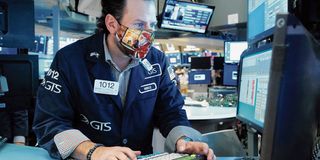What marketing looks in the metaverse

A trader works on the floor of the New York Stock Exchange (NYSE) at the start of trading. marketing in metaverse is said to influence performance at the stock market. PHOTO| FILE
What you need to know:
- The marketing mix is made up of four P’s: product, price, promotion and place. The metaverse provides a new place to market and new methods of promotion, so it’s no surprise that marketing teams across the globe are excited to get stuck in!.
By Edson Sosten
The word metaverse has become an increasingly common term over the last year, with big name companies investing millions of dollars into the production and development of this new technology. But what really is the metaverse? And what does it mean for the future of marketing?
The idea of the metaverse has captured the attention of brands, retailers, media companies, marketing agencies, and technology platforms. Pioneering business leaders, investors, and entrepreneurs see new opportunities to stake their claim in an as yet to be defined space that promises to revolutionize the internet and what it means to be online and completely change the way people work, play, learn, and shop.
In the metaverse, the ability of brands to establish and maintain genuine connections is going to be the underlayment for success. Funny as it may sound, authenticity is as important to your followers and buyers in the virtual world as it is in the physical one.
Therefore, it will be key for brands to create and host organic spaces where their very own communities can exist.
Creating a virtual platform that anybody can access opens a huge door for companies and brands to market their products and services. The metaverse is still in the development stages, but brands are already getting their foot in the door and reaching out to consumers on this virtual platform.
The marketing mix is made up of four P’s: product, price, promotion and place. The metaverse provides a new place to market and new methods of promotion, so it’s no surprise that marketing teams across the globe are excited to get stuck in!.
The metaverse allows you to create your own platform, designing a world dedicated to a brand’s products or services.
This process takes lots of time and research, as well as requiring heavy financial investment, but has already proven to be worthwhile by a multitude of brands.
Shopify, an e-commerce platform for online stores hosted its 2022 Summit inside the metaverse. Partnered with Spotify and Uber Eats, users could buy merchandise, listen to music and have actual food delivered, all from inside the experience. Hosting a virtual convention exponentially increases the size of the potential audience in comparison to a physical event that is limited by the location and available space.
The metaverse has opened new opportunities for virtual collectables, which have proven successful in the past through various online video games that allow players to purchase collectable items. Nike has utilised this within the metaverse by creating a purpose built metaverse space named Nikeland, using the Roblox platform.
Users can purchase exclusive Nike digital products, that can be worn by their avatar and displayed within their own personal section of Nikeland. Since it launched in November 2021, Nike has had over 7 million users on the platform.
Native advertising is transferable to the metaverse, with billboards available to advertise on virtual roads, as well as on-platform product placement. There are also various sponsorship opportunities for sporting and music events held within the metaverse.
Big brands like Coca-Cola and Samsung have already utilised advertising on this new platform. Coca-Cola launched a limited edition drink inside the metaverse and Samsung created a treasure hunt on the platform where users played to win a Galaxy S22.
Both VR and AR open up a world of marketing opportunities for a variety of brands. By hosting products in the metaverse, users can see a virtual 3D model of the product before buying.
Hyundai has utilised this feature by creating a virtual Motorstudio on the platform, where users can check out different vehicle models, watch informative videos and purchase merchandise. The metaverse is providing a new type of platform, but it isn’t going to replace traditional marketing methods, at least for the foreseeable future.
Not every company will benefit from what the metaverse can offer, but others will.
I think we’ll begin to hear an increasing amount of brands spreading into the metaverse, however, we’re not going to completely wipe out reality for a virtual version.
Think about an entire virtual world where users can socialize, game, and experience your offerings through technology….
In Conclusion,
Although the metaverse is still in its early stages of development, it’s important for brands to start preparing now for a future where VR becomes more mainstream.
There are many ways businesses can get ahead of the curve and create virtual reality experiences that engage customers and drive sales.
Whether we like it or not, the metaverse is coming and will impact society at all levels. Among the fields that will be most affected is marketing, as the tools and tactics will undergo a dramatic shift from flat content delivered in the third person to immersive experiences delivered in the first person
The opportunities for marketing in metaverse are endless, and we’ve only scratched the surface. Start using metaverse in your marketing campaigns if you want to gain an early advantage over your competitors. It’s a new frontier that will change the game forever.
Coming up with marketing strategies in the virtual world similar to a video game in many ways sure sounds fun.
Use current marketing experience in the virtual environment to deep dive into how metaverse marketing can help you profit better.
The metaverse will revolutionize digital marketing, and marketers who take advantage of this digital world will grow at a much faster speed than others.
Edson Sosten is Events Manager at Mwanachi Communications Ltd




